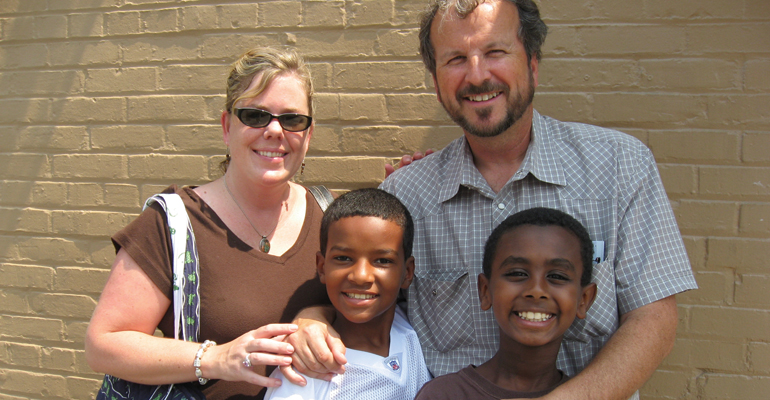My husband and I sat at the table in our kitchen, gazing at photos of our sons from Ethiopia, whom we’d soon meet for the first time. Wearing a white sweater, two-year-old Yakob had a distended belly, like that of a child with severe malnutrition.
Examining Ayalkbet’s picture, I was haunted by the look in his eyes. I hated to imagine the events that led him to be abandoned, in a marketplace in Addis Ababa, at age three.
“He looks hungry,” I told Rick.
“Yeah,” my husband replied softly.
I’d spent countless hours staring at these photographs when I should have been trying new recipes. I’d learned that the boys would need a bland diet at first, but even preparing rice and eggs was a challenge for me. I wasn’t much of a cook.
Fullness for All
Rick and I pressed our faces to the glass in the waiting area at the airport. Grandparents, cousins, aunts, and uncles gathered behind us. When we were handed our sons, the tears I’d been holding back rolled down my cheeks. Our relatives greeted the boys, and Rick and I shared them briefly before we each gathered a son in our arms.
Outside, a gust of January air hit us. During the car ride, they smiled in their seats, with my 14-year-old stepdaughter, Vanessa, sitting between them. The boys batted helium-filled balloons back and forth. Ayalkbet spiked one into Vanessa’s blonde bob. “Hey!” she cried.
I turned around and looked at them. I couldn’t believe they were finally here. I felt a fullness my heart has never known.
As they toddled up the walk toward the front door of our small, Cape Cod home, they noticed the snow. They started speaking in Amharic, and, before we knew it, they were scooping handfuls of it into their mouths.
We picked up the boys and went inside. At dinner, their eyes lit up when the pizza box was opened at the table. They called it “dabo,” a word we learned refers to any form of bread. Ayalkbet made little humming noises between bites. With their cheeks full, like squirrels, they kept pointing to the box, smiling and saying, “dabo.”
The next morning, I served hard-boiled eggs. “Nicolai!” they exclaimed, their faces beaming. For lunch, I served plain spaghetti, which they gobbled up.
I had plenty of time to learn how to cook more elaborate meals, I thought, now that I’d be at home with the boys. But we hit the ground running: In week one they were treated for lice and parasites. Before I knew it, we were shopping for larger shoes. The years flew by.
A Meal to Remember
Our sons are now nine and 10, and my culinary skills remain mediocre at best, especially when it comes to preparing meat. Holidays present unique challenges. Last Thanksgiving was a perfect example. Although Rick and I are vegetarians, our sons are not, and each year I prepare a traditional Thanksgiving dinner. During the 364 days between these annual rituals, I always forget how taxing it is.
The day before Thanksgiving, Ayalkbet and I selected a 16-pound turkey at the grocery store, the smallest free-range bird available. Arriving home, I tossed it in the freezer. On Thanksgiving morning, I transferred the frozen bird into the refrigerator to thaw, thinking it would be ready by 3 p.m., plenty of time before dinner. When I went to cook the bird, though, it was still hard as a rock. I removed the wrapper, assuming that running water would thaw it. When the turkey didn’t soften, I picked up the plastic wrapping and read the instructions: Thaw completely before unwrapping. Rick and the boys gathered around the sink.
“Call somebody,” my husband instructed. “Call my sister.”
“I’m not going to call your sister. She’ll tell everybody.”
I went out to the porch and dialed my equally cooking-impaired aunt in Michigan, who referred me to the Butterball hotline. “I had a thawing problem once, and they walked me through it,” she said reassuringly.
All of the Butterball operators were busy assisting other meat-cooking illiterates. I followed a prompt to the pre-recorded thawing tips, where I learned that a bird must thaw one day for every four pounds of weight. My heart sank. Then the recording offered a short cut: immersing the bird in water for up to nine hours, keeping the turkey in its wrapper during the process.
I approached the family with the bad news. Rick started hosing the bird down, pulling at its wings.
“It has to be in the wrapper to do that, or we’ll get salmonella.”
“What do we do?” he asked.
“It’s too big to fit in the microwave.”
Yakob watched me carefully. “Does this mean we’re not having turkey?”
“I guess not.”
“We can still have mashed potatoes and gravy,” said Ayalkbet.
We ate our side dishes. “You know, Mom,” Ayalkbet commented, between bites. “For Christmas dinner, we should have a turkey and a ham.”
Rick raised his eyebrows at me.
We ate our pumpkin pie. At least I managed to thaw the whipped cream.
I certainly wasn’t giving my sons the meals to remember, as I had planned to in those months of waiting for them to arrive from Ethiopia. But what is important is that we’re together. We have a roof over our heads, and access to things I took for granted before meeting our sons. Things like snow, pizza, and all kinds of “dabo.”
I glance at Ayalkbet, who is pressing his fingers into the crumbs of his dessert plate. His eyes shine and his skin glows. Yakob lifts his shirt and pats his belly. Our boys are healthy, happy, and delightedly full.
For this, I give thanks.



